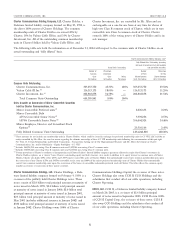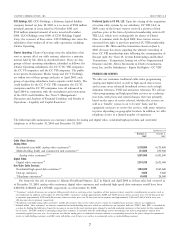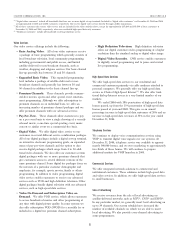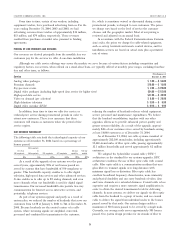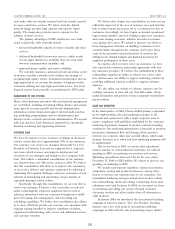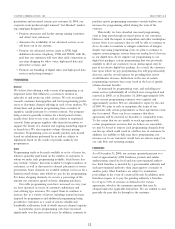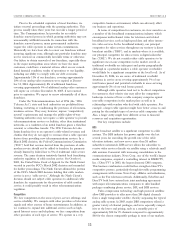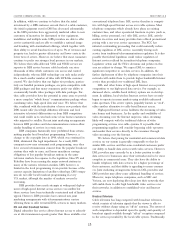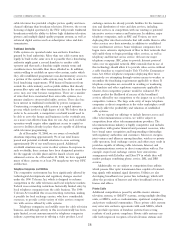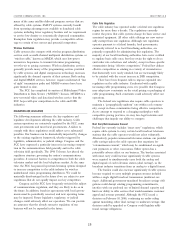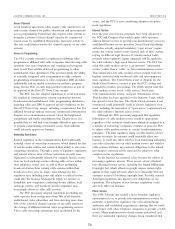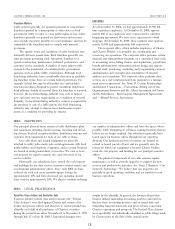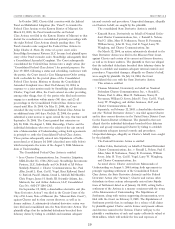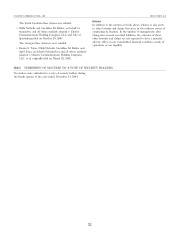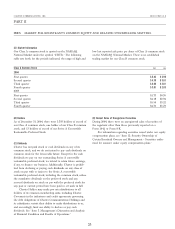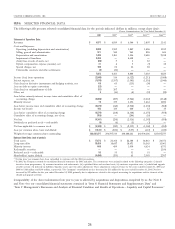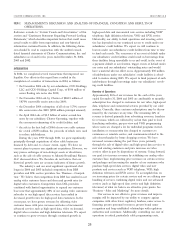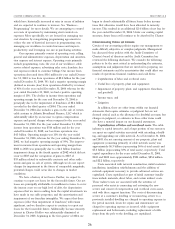Charter 2004 Annual Report Download - page 26
Download and view the complete annual report
Please find page 26 of the 2004 Charter annual report below. You can navigate through the pages in the report by either clicking on the pages listed below, or by using the keyword search tool below to find specific information within the annual report.
CHARTER COMMUNICATIONS, INC. 2004 FORM 10-K
courts, and the FCC is now considering adoption of replace-
Access Channels ment regulations.
Local franchise agreements often require cable operators to set
aside certain channels for public, educational and governmental Internet Service
access programming. Federal law also requires cable systems to Over the past several years, proposals have been advanced at
designate a portion of their channel capacity for commercial the FCC and Congress that would require cable operators
leased access by unaffiliated third parties. Increased activity in offering Internet service to provide non-discriminatory access to
this area could further burden the channel capacity of our cable unaffiliated Internet service providers. Several local franchising
systems. authorities actually adopted mandatory ‘‘open access’’ require-
ments, but various federal courts rejected each of these actions,
Access to Programming relying on different legal theories. It remains unclear today
The FCC recently extended a regulation prohibiting video precisely what regulatory regime ultimately will be applied to
programmers affiliated with cable companies from favoring cable the cable industry’s high-speed Internet service. The FCC has
operators over new competitors and requiring such program- ruled that cable modem service is an interstate ‘‘information
mers to sell their satellite-delivered programming to other service,’’ rather than a ‘‘cable’’ or ‘‘telecommunications service.’’
multichannel video distributors. This provision limits the ability This classification left cable modem service exempt from the
of vertically integrated cable programmers to offer exclusive burdens associated with traditional cable and telecommunica-
programming arrangements to cable companies. DBS providers tions regulation. The United States Court of Appeals for the
traditionally had no similar restriction on exclusive program- Ninth Circuit however, vacated in part the FCC’s ruling and
ming, but the FCC recently imposed that restriction as part of remanded for further proceedings. The Ninth Circuit held that
its approval of the DirecTV-News Corp. merger. cable modem service is not ‘‘cable service,’’ but is part
The FCC has also adopted regulations to avoid unreasona- ‘‘telecommunications service’’ and part ‘‘information service.’’
ble conduct in retransmission consent negotiations between That decision has been appealed to the Supreme Court, which
broadcasters and multichannel video programming distributors, has agreed to hear the case. The Ninth Circuit decision, if not
including cable and DBS. It imposed special conditions on the overturned, could potentially result in adverse regulatory treat-
DirectTV-News Corp. merger, including a requirement that Fox ment, including the imposition of ‘‘open access’’ requirements on
affiliated broadcast stations enter into commercial arbitration for the cable industry’s Internet access service.
disputes over retransmission consent. Given the heightened Although the FCC previously suggested that regulatory
competition and media consolidation that Charter faces, it is forbearance of cable modem service would be appropriate,
possible that we will find it increasingly difficult to gain access regardless of the technical classification ultimately assigned to it,
to popular programming at favorable terms. Such difficulty a number of technology companies continue to press the FCC
could adversely impact our business. to subject cable modem service to certain ‘‘nondiscrimination
principles.’’ The final regulatory status of cable modem service
Ownership Restrictions remains uncertain. Its outcome could materially affect our
Federal regulation of the communications field traditionally business. It could also affect whether local franchising authorities
included a host of ownership restrictions, which limited the size can collect franchise fees on cable modem service and whether
of certain media entities and restricted their ability to enter into cable systems will have any payment obligations to the federal
competing enterprises. Through a series of legislative, regulatory, government’s universal service fund and be subject to other
and judicial actions, most of these restrictions recently were common carrier regulations.
eliminated or substantially relaxed. For example, historic restric- As the Internet has matured, it has become the subject of
tions on local exchange carriers offering cable service within increasing regulatory interest. There is now a host of federal
their telephone service area, as well as those prohibiting laws affecting Internet service, including the Digital Millennium
broadcast stations from owning cable systems within their Copyright Act, which affords copyright owners certain rights
broadcast service area, no longer exist. Changes in this against us that could adversely affect our relationship with any
regulatory area, including some still subject to judicial review, customer accused of violating copyright laws. Recently enacted
could alter the business landscape in which we operate, as Anti-Spam legislation also imposes new obligations on our
formidable new competitors (including electric utilities, local operations. The adoption of new Internet regulations could
exchange carriers, and broadcast/media companies) may adversely affect our business.
increasingly choose to offer cable services. Phone Service
The FCC previously adopted regulations precluding any The 1996 Telecom Act created a more favorable regulatory
cable operator from serving more than 30% of all domestic environment for us to provide telecommunications services. In
multichannel video subscribers and from devoting more than particular, it limited the regulatory role of local franchising
40% of the activated channel capacity of any cable system to authorities and established requirements ensuring that we could
the carriage of affiliated national video programming services. interconnect with other telephone companies to provide a viable
These cable ownership restrictions were invalidated by the service. Many implementation details remain unresolved, and
there are substantial regulatory changes being considered that
16


